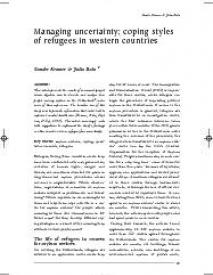Managing uncertainty; coping styles of refugees in western countries
This article presents the results of a research project whose objective was to describe and analyse how people seeking asylum in the Netherlands2 make sense f their experience. The broader aim of this study was to provide information that could lead to improved mental health care (Kramer, Bala, Dijk van, & Öry, 2003). This article accordingly ends with suggestions to implement the study’s findings in other countries where refugees face uncertainty.
Key words: asylum seekers, coping, qualitative research, refugees
Geachte bezoeker,
De informatie die u nu opvraagt, kan door psychotraumanet niet aan u worden getoond. Dit kan verschillende redenen hebben,
waarvan (bescherming van het) auteursrecht de meeste voorkomende is. Wanneer het mogelijk is om u door te verwijzen naar de bron
van deze informatie, dan ziet u hier onder een link naar die plek.
Als er geen link staat, kunt u contact opnemen met de bibliotheek,
die u verder op weg kan helpen.
Met vriendelijke groet,
Het psychotraumanet-team.
Reference:
Sander Kramer; Julia Bala | 2004
In: Intervention: the international journal of mental health, psychosocial work and counselling in areas of armed conflict, ISSN 1571-8883 | 2 | 1 | 33-42
http://www.interventionjournal.com/sites/default/files/33-42%20Kramer.pdf
In: Intervention: the international journal of mental health, psychosocial work and counselling in areas of armed conflict, ISSN 1571-8883 | 2 | 1 | 33-42
http://www.interventionjournal.com/sites/default/files/33-42%20Kramer.pdf


